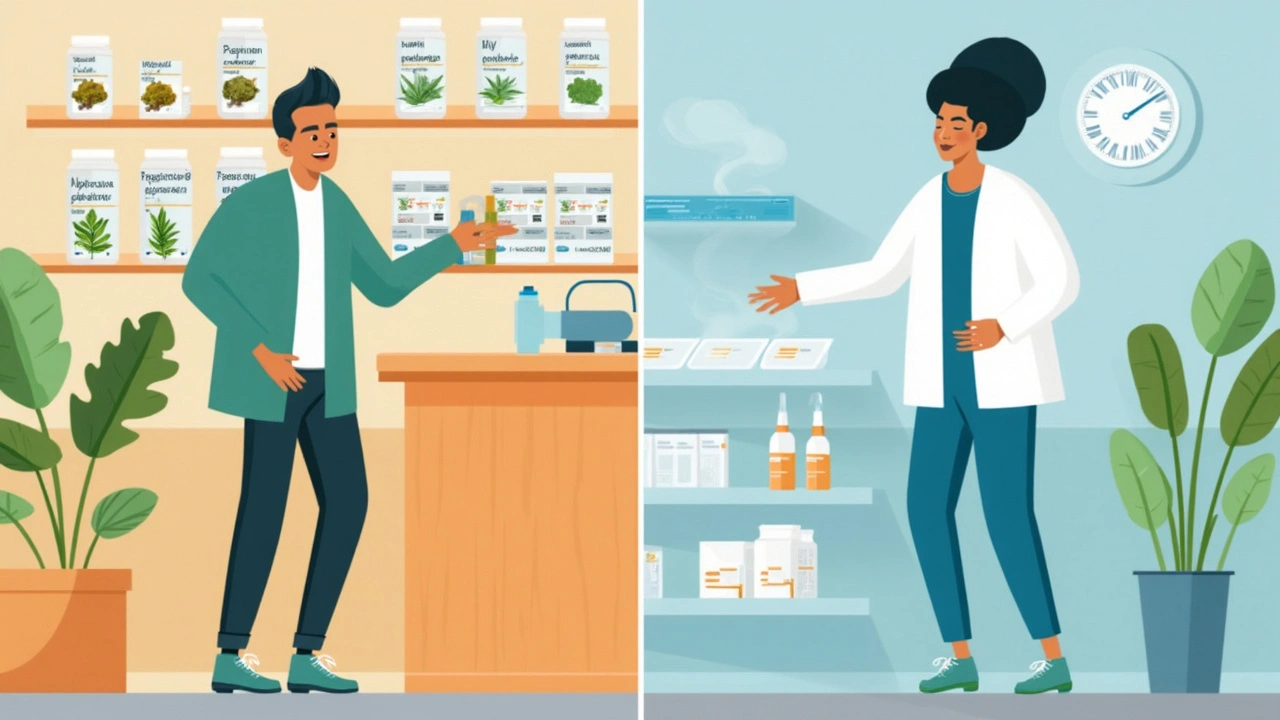Imagine you’re out of Ventolin, wheezing, and someone hands you a bottle of herbal syrup. Panic sets in—can a plant really open up your airways like that blue inhaler does? The hunt for a natural alternative to Ventolin isn’t just about curiosity—it’s about finding real options for the millions dealing with asthma and stubborn coughs. And the solutions out there? They range from ancient Chinese herbs to supplements you can find at any health shop.
The Science Behind Herbal Bronchodilators: More Than Old Wives’ Tales?
Let’s cut through the hype first—bronchodilators are a lifeline for anyone with asthma, but the classic options are usually pharmaceuticals. Ventolin, with its trusty albuterol, is the standard go-to for breathing emergencies. But herbs like ephedra and ivy leaf, plus minerals like magnesium, are whispered about on forums, in herbalist shops, and sometimes even by doctors who dabble in both worlds.
How do these natural choices stack up? Here’s where things get interesting. Ephedra, known in Traditional Chinese Medicine as Ma Huang, is a powerhouse—it contains ephedrine, a natural compound that acts a lot like albuterol. Ephedrine works by relaxing the muscle cells in your airways, letting them open up wide for easier breathing. Ivy leaf, common in cough syrups in Europe, contains saponins that help clear mucus and stop spasms in the lungs. Magnesium turns up in hospital ERs; in high doses, it can relax the airway muscles fast. So these aren’t just folk remedies—they’re used because they actually trigger physical changes in your airways.
The million-dollar question: is there research to back these up? Yep, but with a few plot twists. Clinical trials show ephedra can boost lung function and ease asthma symptoms, but it comes with some scary side effects (think racing heart and high blood pressure). Ivy leaf gets thumbs up from several European studies—kids and adults with chronic bronchitis found their coughs lessened and breathing got easier. As for magnesium, doctors have been injecting it into people with raging asthma attacks for decades, and studies have found it can improve airflow (measured by peak expiratory flow rate) when inhalers aren’t doing enough.
Check out this simple table for quick stats on each:
| Herbal Option | Main Compound | Effect | Research Backing |
|---|---|---|---|
| Ephedra | Ephedrine | Opens airways, boosts lung function | Strong, but with risks |
| Ivy Leaf | Saponins (hederacoside C) | Clears mucus, reduces spasms | Widely used, good support |
| Magnesium | Magnesium sulfate | Relaxes muscles in airways | Proven for severe cases |
So yeah, the science is there—but it’s not always a plug-and-play swap for your inhaler. Let’s break down each option.
Ephedra: Powerful...and a Little Too Wild?
Ephedra is like the whiskey of natural bronchodilators—potent, not always legal, and comes with a warning label. This plant has been used for over two thousand years in Asia for everything from asthma to the sniffles. It’s also the base for ephedrine, once found in some over-the-counter allergy meds. Whether in herbal tea or capsules, ephedra does loosen tightness in the chest and can tide someone over when they’re short of breath.
But here’s the catch: ephedra got a bad rap when way too many people misused it for weight loss and sports performance, leading to bans in the U.S. and restrictions elsewhere. Why? Side effects can get intense. Think palpitations, anxiety, raised blood pressure, and in rare cases, strokes or heart attacks. These risks are much higher if you have underlying heart issues or use larger doses.
If you’ve ever wondered why old-school cold meds “worked so well,” odds are it was the ephedrine. A controlled dose can act like a weaker, less precise version of albuterol, which is why it worked. But the trouble with natural sources is dosing isn’t consistent—you might get just enough to help, or way too much. Some researchers argue that, handled properly, tiny doses of ephedra or ephedrine could help people with mild, occasional asthma. In reality, unless you’re under supervision, most docs will steer you clear because the danger outweighs the benefit. Still, it's fascinating that something so old can act so similarly to a trusted inhaler.
There’s a lesson here: herbal doesn’t always mean safe. And just because something comes from a plant doesn’t mean you can’t overdose, especially with stimulants.

Ivy Leaf: The Unsung Hero in Cough Syrups
Now, ivy leaf doesn’t pack the punch of ephedra, but that’s not always a bad thing. This humble climbing plant has scored points across Europe, especially in plant-based syrups for kids. German researchers have long studied standardized extracts of ivy leaf, showing that it helps cut back on cough intensity and duration. The secret sauce? Saponins, specifically hederacoside C, which thins mucus and eases muscle spasms in the bronchial tubes.
One neat thing with ivy leaf—dosing is much more predictable. Syrups and drops have been carefully measured out, so you can actually get the right amount. In several trials involving kids with chronic bronchitis or mild asthma, daily use shortened their cough spells and improved airflow. No racing heart, no shakes, just fewer symptoms.
Of course, nothing’s perfect. A small percentage of people are allergic, and taking too much can cause tummy issues, but you don't see the wild swings in blood pressure you get with ephedra. Doctors in some pediatric clinics actually start here before prescription cough suppressants, especially for wet or productive coughs. If you want something to support airways without the kick of a stimulant, ivy leaf is definitely worth looking at.
There’s also something almost old-school about it—it feels less like biohacking and more like letting your body ease itself through a rough patch. The taste? Not great, but the results speak for themselves.
Magnesium: How a Simple Supplement Calms Airways
Magnesium isn’t an herb, but it deserves a spot here because of how it works on airways. Hospitals often use intravenous magnesium sulfate to help people who aren’t responding to an inhaler during a bad asthma flare. When airways get extra tight, magnesium steps in by blocking calcium’s effect on muscle cells, basically relaxing the smooth muscle in bronchial tubes. This isn’t magic—it's pure biochemistry, and doctors have watched it reverse tight breathing in real time.
On the supplement shelves, magnesium comes in pills or powders. Over-the-counter versions don’t work as fast as IV magnesium in the emergency room, but steady use seems to lower the risk of asthma attacks, especially if you’re deficient. Some studies found kids with low magnesium had more frequent and severe asthma flares; once their levels went up, their symptoms faded a bit. It’s super affordable, and most people tolerate it well unless you have kidney troubles.
If you’re aiming for better breathing and fewer nighttime wake-ups, keeping your magnesium topped up can help. Food sources like nuts, leafy greens, and beans make a difference too. Don’t expect a single magnesium pill to knock out an attack—this is a long-term assist, not a fast-acting rescue.
Curious about blending natural options with classic meds? There’s a whole discussion about combining these approaches for the best effect. But safety comes first. If you’re tempted to swap your rescue inhaler for a natural fix, talk it out with your healthcare provider. They can help you pick the safest route and avoid dangerous overlaps.
For a deep dive—especially if you want real stories, side-by-side comparisons, and tips for using herbs wisely—check out this solid post on natural alternative to Ventolin. Lots of helpful details in one place.

Tips, Takeaways, and Making Sense of the Natural Asthma Toolbox
If you’re frustrated with constant inhaler use or just like the idea of hacking your way to easier breathing, you’re not alone. The herbal bronchodilator landscape is full of options, but picking the safest, most effective approach takes a little research—and always, a little common sense.
- Don’t swap out your prescribed inhaler without backup: Herbs are great for extra support, but not for ditching your main asthma meds.
- Read the label, watch the dose: Especially if you’re trying ephedra or anything with stimulants. Natural doesn’t always mean gentle.
- Standardization matters: Go for products where the main ingredient (like ivy extract or magnesium dose) is clearly stated, not just generic teas or powders.
- Keep an eye out for allergies: Ivy leaf is a plant, so folks with sensitivities might react badly.
- Magnesium is safest for most people: But ask your doctor if you’re on blood pressure meds or have kidney issues.
- Pair herbs with healthy habits: Clean air, exercise, and regular doctor check-ins always beat any supplement on their own.
Want to track what works for you? Try keeping a notebook of your treatments and symptoms. Apps make this easy—just jot down when you use an inhaler, try a supplement, or notice breathing changes. It’ll make your next med review a whole lot smarter. If you ever start a new herbal remedy and feel your heart pounding or notice any weird side effects, stop and reach out for help fast.
The bottom line—nature has handed us some useful tools. Just respect the power, tread carefully, and mix the old school with the new for the best shot at breathing easy. And if you’re the curious type who chases after data and lived experience, you’ll find the most success by blending science with a little trial and error.



Erin Corcoran
May 26, 2025 at 10:50OMG yes!! Ivy leaf syrup saved my kid’s chronic cough last winter 🙌 No more nighttime wheezing, and the taste? Meh, but we mixed it with honey and called it ‘magic juice’. Way gentler than albuterol, and no jitters. 🌿
shivam mishra
May 27, 2025 at 08:57Just want to clarify something real quick-ephedra isn’t banned because it’s dangerous, it’s banned because people were snorting it in gym supplements. The plant itself? Used safely in TCM for centuries. But yeah, don’t DIY it. Standardized extracts are fine, but raw leaf? Too much variability. Stick to ivy or magnesium if you’re not under supervision.
Kathy Pilkinton
May 28, 2025 at 01:15So let me get this straight-you’re seriously suggesting people swap their inhaler for a tea made from climbing vines? Bro. I’ve seen ERs. You don’t get to ‘trial and error’ when your airway’s shutting down. This post reads like a wellness influencer’s dream.
Mansi Gupta
May 28, 2025 at 13:05I appreciate the balanced take. In India, we’ve long used tulsi and licorice root for respiratory issues-not as replacements, but as supportive care. The science behind ivy leaf is actually quite solid, especially for pediatric cases. It’s not about replacing Ventolin, but complementing it wisely.
Holly Dorger
May 29, 2025 at 05:12I’ve been taking magnesium citrate daily for 2 years now-my asthma attacks dropped by like 70%. Not a miracle, but a steady win. My doc was skeptical until I showed him my peak flow logs. If you’re low on magnesium (and most people are), it’s one of the safest bets out there. No hype, just science.
Mike Gordon
May 29, 2025 at 20:32Ephedra is a controlled substance for a reason but also because it’s been weaponized by the supplement industry. People think natural = safe but that’s not true. My uncle had a stroke from an ephedra tea he bought online. He was 52. Don’t gamble with your lungs.
Amanda Nicolson
May 30, 2025 at 18:33I used to think herbal remedies were just hippie nonsense until I got stuck in a remote village in Nepal with no pharmacy. A local healer gave me a bitter leaf infusion-tasted like dirt-but within 20 minutes, my chest opened up like a window in summer. I don’t know if it was the plant or placebo or both-but I’ll never dismiss it again. Nature’s got tools we’ve forgotten how to use.
Penny Clark
June 1, 2025 at 10:47ivy leaf syrup is legit. i tried it after my kid had a bad cold and her cough wouldn’t quit. we switched from the OTC syrup to the ivy one (bought it at Whole Foods) and within 3 days she was breathing like normal again. no more night wakings. the bottle says ‘for children over 1’ so i knew it was tested. also no sugar! huge plus.
Jim Allen
June 2, 2025 at 19:52We’re all just trying to outsmart our biology, aren’t we? Inhalers are like Band-Aids on a bullet wound. Herbs are the ancient code the body already understands. Maybe we’re not meant to be pumping synthetic stimulants into our lungs forever. Just saying.
Jackson Olsen
June 2, 2025 at 23:12I tried magnesium after reading this. Took 400mg daily. No magic, but my nighttime cough faded. Also started eating more spinach. Best part? No side effects. My doctor said ‘keep doing that.’
Niki Tiki
June 4, 2025 at 19:21Why are we even talking about this? In America we have the best medicine in the world. If you can’t afford your inhaler, get a job. Stop chasing herbal fairy tales. This is why our healthcare system is broken-people think tea fixes everything.
Scott Dill
June 5, 2025 at 17:24I’m a paramedic. Saw a guy in full respiratory arrest last month. He’d stopped using his inhaler because he read ‘herbs are better.’ He didn’t make it. Herbs can help, but never replace your rescue med. Ever.
Arrieta Larsen
June 5, 2025 at 17:57I’m not a doctor, but I’ve had asthma since I was 5. I use my Ventolin religiously. But I also take ivy leaf extract daily and drink ginger-turmeric tea. It doesn’t replace my inhaler-it just makes the days between attacks less miserable. Small wins matter.